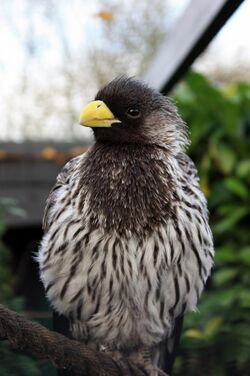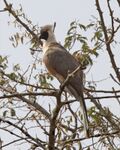Biology:Crinifer
| Crinifer | |
|---|---|

| |
| Western plantain-eater (Crinifer piscator) at Lotherton Hall, England | |
| Scientific classification | |
| Domain: | Eukaryota |
| Kingdom: | Animalia |
| Phylum: | Chordata |
| Class: | Aves |
| Order: | Musophagiformes |
| Family: | Musophagidae |
| Genus: | Crinifer Jarocki, 1821 |
| Type species | |
| Phasianus africanus[1] Latham, 1790
| |
| Species | |
|
C. piscator | |
Crinifer is a genus of birds in the turaco family. They are restricted to Africa. Formerly, the genus only contained the plantain-eaters, but in 2021, go-away-birds were merged into the genus.
They are large, noisy, and conspicuous birds, but lack the brilliant colours of their relatives. They are mainly grey, with a long tail and an erectile head crest. They feed on fruit, especially figs, seeds, and other vegetable matter.
Unlike many of the brighter forest dwelling turacos these are birds of African open country and have drab grey and white plumage. In Southern Africa, these birds are known as kwêvoëls, though they are also called loeries along with the other turacos.
The go-away-birds are named for their raucous "go away" call.[2]
The genus was erected by the Polish zoologist Feliks Paweł Jarocki in 1821 with the western plantain-eater (Crinifer piscator) as the type species.[3] The name combines the Latin crinis meaning "hair" and -fer meaning "bearing".[4]
The genus now contains five species:.[5]
| Image | Scientific name | Common Name | Distribution |
|---|---|---|---|
 |
Crinifer zonurus | Eastern plantain-eater | east Africa. |
 |
Crinifer piscator | Western plantain-eater | west Africa |
 |
Crinifer personatus | Bare-faced go-away-bird | Ethiopia, and Burundi, DRC, Kenya, Malawi, Rwanda, Tanzania, Uganda and Zambia. |
 |
Crinifer concolor | Grey go-away-bird | southern Angola, southern DRC, Zambia, southern Tanzania, Malawi, Mozambique, Namibia, Botswana, Zimbabwe, South Africa and Swaziland |
 |
Crinifer leucogaster | White-bellied go-away-bird | eastern Africa |
References
- ↑ "Musophagidae". The Trust for Avian Systematics. https://www.aviansystematics.org/4th-edition-checklist?viewfamilies=69.
- ↑ Education, Jacana (2004) (in en). Lowveld and Kruger Guide. Jacana Media. p. 46. ISBN 978-1-919931-20-3. https://books.google.com/books?id=BHjqiA7GQsoC&pg=PA46.
- ↑ Peters, James Lee, ed (1940). Check-list of Birds of the World. 4. Cambridge, Massachusetts: Harvard University Press. p. 9. https://biodiversitylibrary.org/page/14476461.
- ↑ Jobling, James A. (2010). The Helm Dictionary of Scientific Bird Names. London: Christopher Helm. p. 121. ISBN 978-1-4081-2501-4. https://archive.org/details/Helm_Dictionary_of_Scientific_Bird_Names_by_James_A._Jobling.
- ↑ Gill, Frank; Donsker, David, eds (2019). "Turacos, bustards, cuckoos, mesites, sandgrouse". World Bird List Version 9.2. International Ornithologists' Union. https://www.worldbirdnames.org/bow/turacos/.
Wikidata ☰ Q570640 entry
 |

